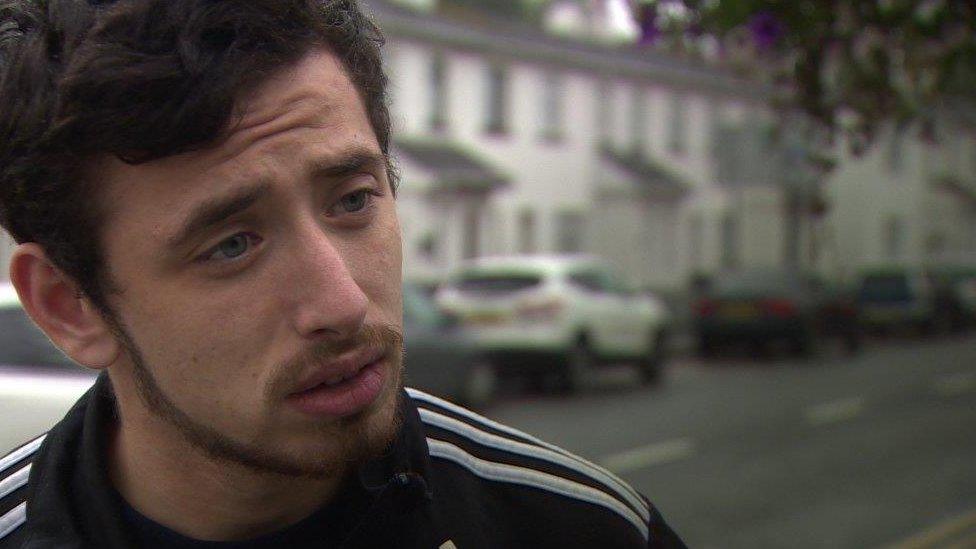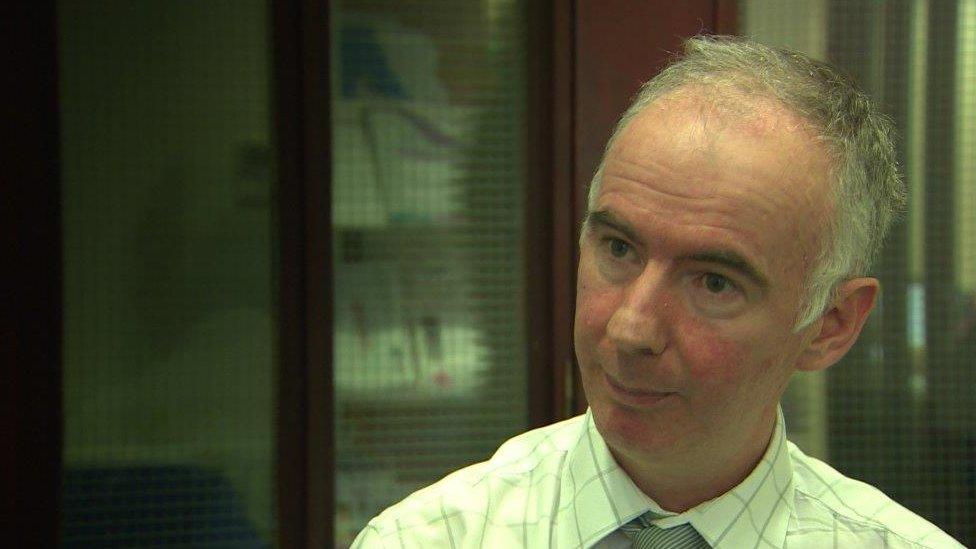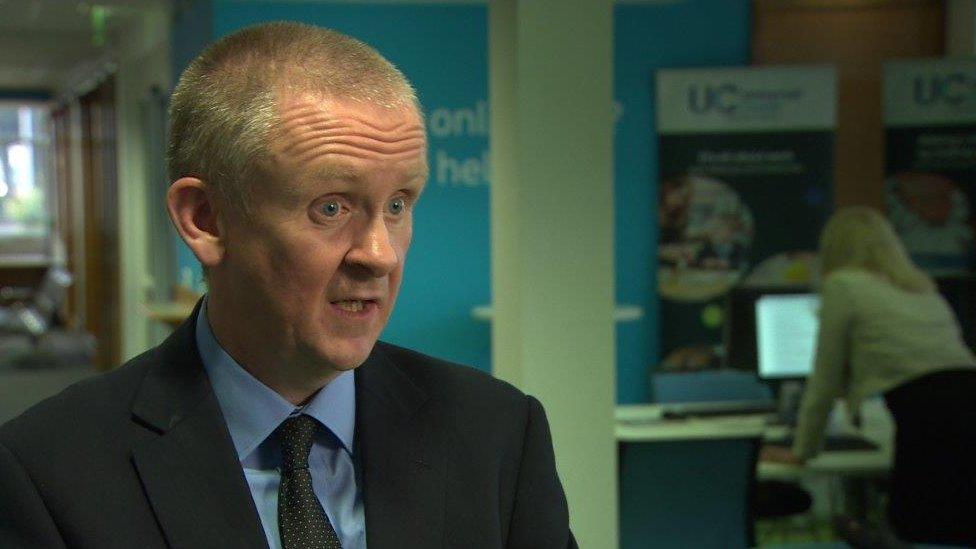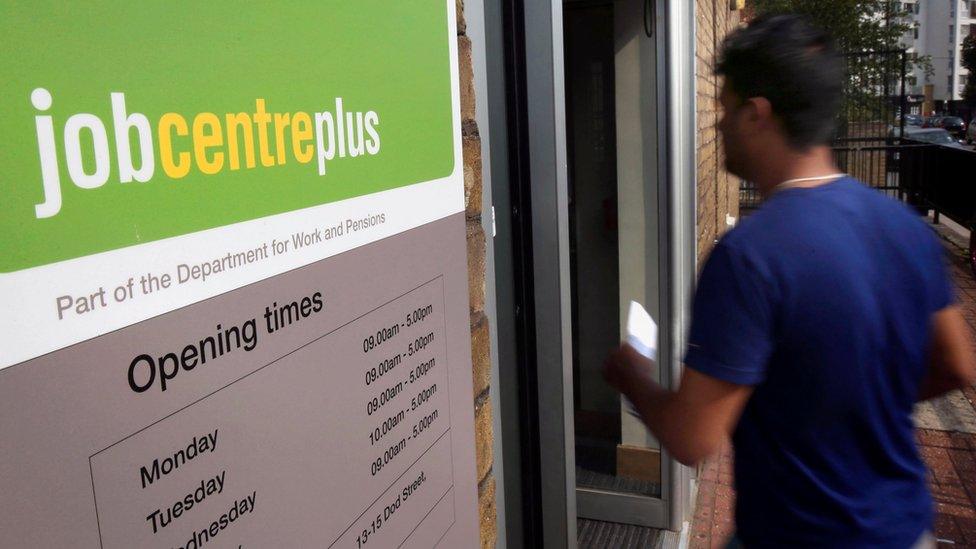Advice NI: 'Suspend introduction of Universal Credit'
- Published
- comments

Dylan Young says he would love a job but fears his lack of qualifications will hamper his efforts
A charity has called for this week's major changes in how benefits are paid in Northern Ireland to be suspended.
Universal Credit rolls six benefits into one single payment.
Its introduction has caused serious problems in Great Britain, with delays to payment causing rent arrears and homelessness.
The changes are being introduced in Limavady from Wednesday, before being rolled out across NI over the next two years.
More than 300,000 families will be affected - more than 100,000 will be worse off because of cuts to disability premiums and single-parent allowances.
Kevin Higgins from Advice NI said the main issue was getting that first payment.
"At the minute it's 14 days, and with Universal Credit the target is six weeks," he told BBC News NI.
"If you've no money then how are you going to survive for six weeks? That gets you into the misery that's talked about in GB.
"It gets you into the stories about food banks and people having to get food on the table and it gets you into the stories about housing costs and keeping a roof over your head and the stress and worry of it mixed in with it as well."
"Given the concerns and the clamour from GB around the misery caused by Universal Credit in particular... Advice NI feels it's timely now to call a halt to the roll-out of Universal Credit in Northern Ireland."
SDLP Deputy Leader Nichola Mallon went further, saying Universal Credit had been "an unmitigated disaster".
"The experience of the new welfare rules in England, Scotland and Wales has been characterised by more families in poverty, greater reliance on food banks and a marked increase in homelessness," she said.
'Helpless with money'
Dylan Young, 20, has a learning difficulty and receives benefits:
"I don't think I'll ever get a job I'm not smart enough," said the Limavady man.
"I would love a job but I've no qualifications."

Kevin Higgins from Advice NI wants the introduction of Universal Credit in Northern Ireland to be suspended
"I tried to get a job but there's no hope for me. I'm very worried about the changes and worried that if I lose money I won't be able to live."
Another difference with Universal Credit is that it can be paid monthly, instead of fortnightly, but Mr Young is worried about that too:
"I blow money in one day if I have it," he said.
"I'm helpless with money. I don't know how to manage on my own so I have to give it to my girlfriend to sort out for me."
Another claimant, who didn't want to be identified said: "It's hard when the kids are asking for stuff and you don't have the money and it's telling them no and it's not their fault that I'm on benefits and they're missing out."
Lone parents could be as much as £39 a week worse off under the new system, which is something the single mum with three children is very worried about.
"We're going to be worse off, we're not going to be on the money we're on now - it's hard to cope now with what we get.
"I understand people don't want to pay their taxes to pay benefits... But nobody wants to be on benefits.
She wanted to get a job but said it was hard when she had been relying on benefits for so long.
"I don't want to be on benefits, I don't want my kids to be on benefits, I don't want it to continue on as a cycle."

Denis McMahon from the Department for Communities says a transitional payment will apply if people find their benefits are delayed
Welfare reform caused significant disagreement at Stormont when the changes were first debated, and there are some differences between what was agreed at Westminster and what is being introduced locally.
But with no Executive in place, can these mitigations be guaranteed when Universal Credit is launched on Wednesday?
Denis McMahon from the Department for Communities says they will.
"The more people work they more they can keep that's a key principal of Universal Credit," he said.
"Our intention is to continue to mitigate payments and in addition there's a transitional payment that applies if people find there is a delay."
No local oversight
Under the GB scheme, benefits can be stopped for a maximum of three years if people break the rules.
The Executive agreed to reduce those sanctions to 18 months.
But even then, Denis McMahon sees that as a last resort.
"In a sense sanctions are a failure on the part of everyone concerned and we will work really hard to warn people of the need to avoid sanctions," he said.
"We will contact them through all the means we can have a system to warn people," he said.
"People will know well before that what is expected of them.
"And of course, the other side of this is that people don't fall into sanctions and it's a fair regime and that everyone who is receiving benefits is complying with the same principles."
But Kevin Higgins still has serious reservations.
"Advice NI are worried that given we have no Assembly and no local accountability or oversight, given we know that the social security minister in Westminster is concerned about Universal Credit," he said.
- Published6 December 2016

- Published8 February 2017
